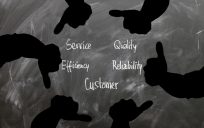The Code for America model puts questions first, coding later. So if you were to ask us what the fellows will build, or the Brigade deploy, or the Accelerator start up — we honestly couldn’t say. This makes the task of weaving together common threads sometimes difficult. As our Government Relations Director mentioned last week, “It’s the challenege of making strategy out of serendipity.”
That said, however, this year, we have tried to identify some common themes for our work, and that of the broader community. This isn’t meant to be descriptive or prescriptive of the year ahead. Instead insquisitive. We have noticed some ideas emerge — for instance “Cites 2.0,” this year’s TED Prize winner — and we think they merit consideration and even debate.
That’s why we are asking experts, activists, entrepreneurs, and leaders to share their insights through short guests posts on the CfA Blog. We have already received confirmations for participation from Clay Johnson, author of Information Diet, Nigel Jacobs from Boston’s New Urban Mechanics, and Rishi Jaitly of the Knight Foundation, and we are actively looking for others to contribute as well. If you’re interested, please don’t hesitate to get in touch.
Below are brief summaries of the themes we hope our contributors will flesh out throughout the year; in the meantime, we would love your input and ideas in the comments.
Themes
City 2.0
Cities are under greater pressure than ever, struggling with budget cuts and outdated technology. Yet at the same time, cities around the world are finding new ways to do more with less, to innovate, and it’s shifting our conception of what’s possible. We believe this is just the beginning of a fundamental shift in the way our cities operate and how we engage within them.
Disruption as a Public Service
Carl Schumpeter described the process of tearing down an existing market and rebuilding it with new, more efficient, and responsive businesses as the process of “creative destruction.” We’ve seen in recent decades this process unfold in multiple industries — books, music, newspapers — for the better. This year, Code for America will be working to bring that same kind of disruption into the public sector, helping government work better for all of us.
The Civic Web
Government has been called the answer to the problem of collective action: the way in which we come together to do that which we cannot do alone. Increasingly, the role of the internet as core collaborative tool for our time is becoming clear. As it evolves, however, it grows ever important to leverage that potential for civic action, to build the civic web.
It’s Not About Politics
Turn on any cable news network, and one story likely dominates the headlines: the national elections. Estimates, in fact, suggest that more than $2 Billion will be spent on just the Presidential alone. Worst of all, these elections effectively narrow the focus of regular citizens — away from their communities, away from their personal ability to make a difference — to a myopic obsession with which one of two people will sit in an oval office hundreds of miles away. We think it’s time that changed.




Leave a Reply
You must be logged in to post a comment.